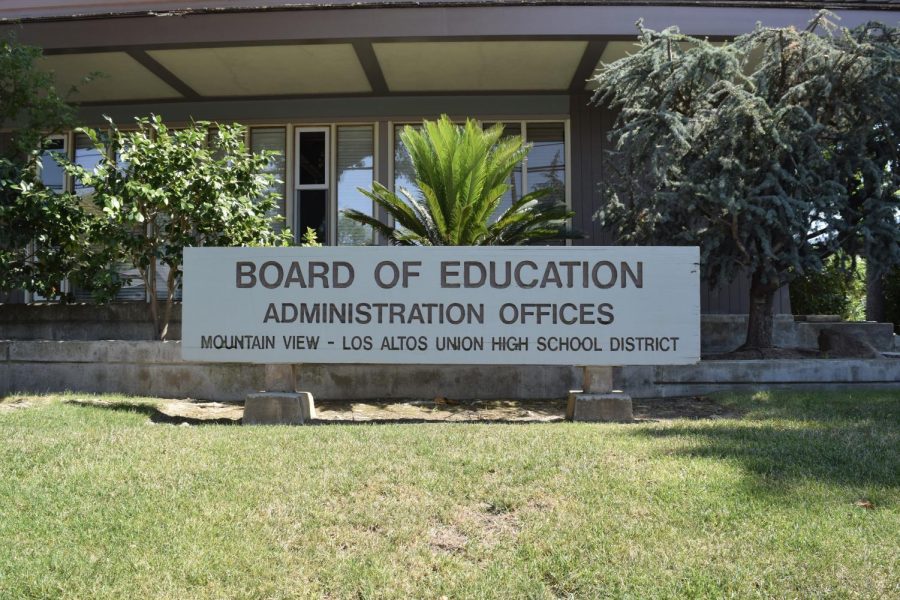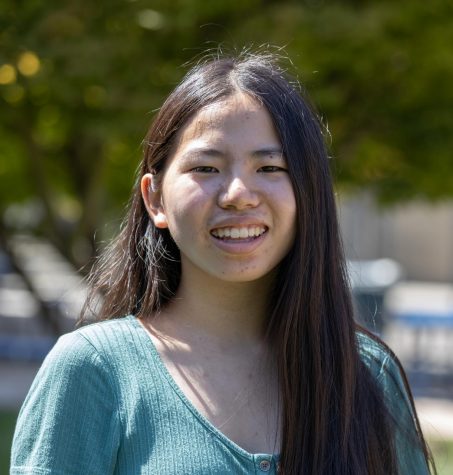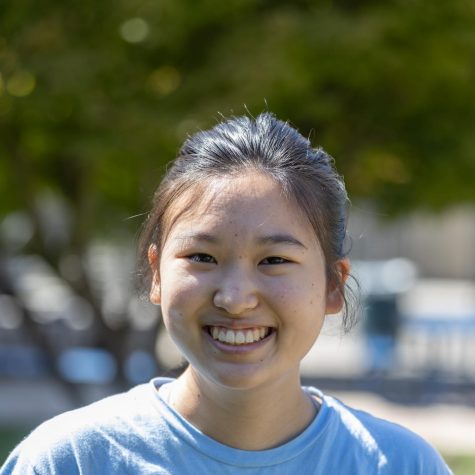Laying the field: Three candidates run for two MVLA board seats
Three candidates are running for two spots on the MVLA Board of Trustees in this year’s upcoming election.
Three candidates are competing for two seats on the Mountain View–Los Altos Board of Trustees in this year’s upcoming election: challenger Laura Teksler and incumbents Sanjay Dave and Dr. Phil Faillace. Fiona Walter, Catherine Vonnegut and Debbie Torok are the three other trustees on the five-member board.
The Talon interviewed candidates about their background, qualifications and priorities. Candidates were also asked about a recent petition on educational reform from the Los Altos SAE and Campus Change MVHS, which included requests for a mandatory ethnic studies course and the removal of school resource officers (SROs) — police officers assigned to safety and crime prevention in schools — from MVLA campuses.
PHIL FAILLACE
Faillace has been on the MVLA board since 1996 and can boast 13 years on the LASD board prior to that; he is also the board chair of the Community Health Awareness Council (CHAC) and co-founder of the Los Altos Education Foundation.
In April, Faillace cast the only dissenting vote against the credit/no-credit grading system when the district moved to distance learning. In a guest opinion for the Mountain View Voice, Faillace wrote that he preferred a hybrid system that would protect at-risk students while preserving the hard work of students who had improved their grades.
Before the pandemic hit, he said he was considering leaving the board after 24 years. Now, however, he feels that his experience is more valuable than ever because he can apply lessons from guiding the community in the past during recessions in the 1990s and 2000s.
According to Faillace, his proudest accomplishment is getting the district to allow open enrollment for AP classes in 2006, making them easily accessible to students. He’s also proud that MVLA had one of the first structured wellness programs in California.
Faillace said his experience on the board has taught him that big change needs a “long runway.” He believes it is critical to build consensus in the community by listening with an open mind, citing group conversations about the stadium lights project.
“It’s important for people to approach each other just as other humans who have problems to solve,” Faillace said.
Priorities
Faillace’s first priority is supporting current seniors and making sure they’re still receiving a quality education that will prepare them for college and the workforce, even in the current remote setting. He believes it is critical to give parents a voice in that conversation.
Additionally, prioritizing social emotional health has always been important to him, and Faillace has been a strong supporter of CHAC’s mission to provide mental health services to the community.
In the post-pandemic future, Faillace sees potential in repurposing distance learning to accommodate students whose extenuating circumstances keep them from attending school. Distance learning could provide academic support for these students until they are able to return to campus. Virtual social-emotional health support could also be provided with resources like CHAC’s tele-health service.
Lastly, he emphasized the importance of ensuring equitable education. Faillace said the pandemic has helped the district identify students who need “augmented support” such as meals and cellular hotspots. In his opinion, the district should increase funding to support more students with extenuating circumstances with counseling and learning support.
Petition
Faillace said that he would vote in favor of implementing ethnic studies, stressing the need to address the vestiges of racism in curriculum and writings, but emphasized the importance of letting teachers and experts lead.
“It’s important to bring reform ideas up from the bottom instead of directing from the top,” Faillance said.
In regard to SROs, Faillace offered several solutions to the accounts of harassment, but stopped short of calling for their removal from campus.
“It was distressing to hear several MVLA students, alumni and teachers describe their interactions with SROs,” Faillace said. “Their accounts of what happened included behaviors that ranged from disrespectful, to intimidating to, in one instance, terrifying. Obviously, such behaviors are inconsistent with MVLA’s goal of building and maintaining a welcoming culture of inclusion.”
“The only solace I found in their accounts was that the interactions seemed to have occurred before the tenures of the current SROs, when training for school resource officers did not address issues of unconscious bias, racial insensitivity and a shortfall of minority representation among SROs,” he said.
According to Faillace, the current SROs include a Black officer and a Latinx supervisor.
“A primary objective of the SRO program is to build mutual empathy, respect and trust between students who have suffered racial discrimination, and police, whose presence makes many of those students ill at ease,” Faillace said. “The many killings of Black men and women by police elsewhere in the country sustains that illness of ease.”
However rare, Faillace believes that there are emergencies that require police presence on campus; in these scenarios, he thinks it’s better to have a police officer who is familiar with the school and has earned the community’s trust. Faillace suggested building this trust between SROs and wary students by holding facilitated conversations in a safe place.
“They could get to know each other as human beings with many problems, likes and dislikes in common,” Faillace said.
In addition, he proposed inviting experienced local scholars like Stanford professors Dr. Jennifer Eberhardt and Dr. Emeritus Philip Zimbardo to discuss their work in studying police interactions with people of color.
“In any case, we have a teachable moment,” Faillace said. “Time to do what we do best — teach.”
SANJAY DAVE
Dave, who is completing his first and sometimes controversial four-year term on the board, has served as its president since January. Dave said he’s re-running for many of the same reasons that he did four years ago.
“I want to provide the best education possible for all of our students,” Dave said. “That requires looking at all these different programs that we have and looking at all the different issues that come upon the board to make a better educational environment for the kids.”
Of the aforementioned programs, Dave said he’s most proud to have expanded AVID, a program for first-generation college students, and Middle College, a program that allows students to take courses at Foothill College.
Dave, whose son is a sophomore at Mountain View High School, said that having a child who’s still enrolled in the district gives him valuable insight into the community.
“I can look over his shoulder and see how his Zoom classes are going and understand that firsthand,” Dave said. “But I’m also connected to all of his friends and all of their parents, so I get texts all the time from people in the community — I think that’s something valuable that I bring.”
Dave also believes his Indian descent grants him a unique perspective on the classroom curriculum across the district. He said discussing textbook curriculums is one place where his experiences have been especially useful.
“One of the books on the list, ‘Siddhartha,’ is about Buddha’s life — but it’s written by a German author,” Dave said. “From that perspective, it doesn’t necessarily provide an accurate view of what somebody in India would have actually experienced.”
Priorities
“My biggest priority is making sure we have a strong distance learning program,” Dave said. “Not only where we’re meeting the curriculum standards for each of our courses, but also making sure that students stay engaged and still enjoy learning.”
Dave said he’s focused on assessing student engagement with metrics like class participation and homework completion, and plans to continue eliminating barriers like WiFi and hardware issues by distributing hotspots and devices. He believes that having staff and counselors reach out to students is integral to keep students engaged during distance learning.
“Distance learning is a new experience for everybody,” Dave said. “We’re going to have to redouble our efforts to make sure that we don’t lose any kids in this process.”
Dave is also working closely with the county and district to ensure that personal protective equipment will be well-stocked and any health guidelines will be met for a future in-person return to school.
“We’re getting close to finding solutions to make sure we can get kids and staff back to school in a safe way,” Dave said. “My first priority is making sure that we maintain a strong and engaged distance-learning curriculum, but my second is working with the county and the school district to figure out how quickly we can get our students and teachers back into the classroom safely.”
Petition
Dave believes that the district should seriously consider introducing an ethnic studies requirement into MVLA curriculum.
“It’s an important conversation to have,” Dave said. “We’re realizing that we need to have an accurate view of other cultures that isn’t the stereotypical view a lot of people grew up with.”
Dave is not in support of having SROs on campus, believing that close relationships between students and staff would foster a better environment.
“There was a student who called me a couple months ago,” Dave said. “She said that the white students would hang out at one end of the parking lot, but the SROs never came to them. They’d always go to another location where brown students were hanging out. SROs create systemic bias, and we need to rethink our relationship with police departments.”
Dave said the district is having internal conversations with the Mountain View and Los Altos Police Departments, which he’ll be meeting with in mid-September.
“The two police departments have been very collaborative and cooperative in the whole conversation,” said Dave.
LAURA TEKSLER
Teksler, the newcomer of the three candidates, is an environmental commissioner for Los Altos and the parent of a Los Altos High School senior. She has been involved with the Parent Teacher Associations at Almond Elementary School, Egan Junior High School and LAHS, and volunteered with various nonprofits.
“Strengthening our community has been my main focus for the past 20 years,” Teksler, who grew up in Mill Valley and attended public schools all the way through college, said.
“The value of public education for all students is very important to me, and I think it’s critical that everyone has access to quality education.”
Teksler said her role on the Los Altos School District Citizens Advisory Committee for Finance has given her greater insight into the workings of school budgets; her additional positions of co-chair for the Los Altos Community Foundation and vice-chair of Los Altos’ Environmental Commission have taught her how to provide “strategic direction while bringing in the voice of families.”
Priorities
“We need to make a plan to get back in class, even if it’s only one day a week,” Teksler, when speaking about her top priorities, said. “School is a vital part of young people’s lives. Even with counseling and other virtual support we can give, I don’t know if we can head off the mental health crisis for students who come out of this.”
She is also mindful of the health concerns students and teachers may have about returning to in-person learning amid the pandemic, and aims to provide alternative ways of receiving education. She said that she would work with teachers to determine what precautions the district would need to take, and would continue to provide a fully remote option — even for Option A students to switch over to — for community members that feel uncomfortable with an in-person return.
Teksler is also concerned about how stress surrounding academic achievement, especially in a district as academically competitive as MVLA, could be detrimental to students’ mental health.
“We need to make sure that all classes are providing love, engagement and excitement for students, so they don’t feel the need to always take AP classes that are going to require too much work and burn them out,” Teksler said.
She plans to ensure that college prep classes are as stimulating as AP or honors courses, providing a less stressful alternative for students with genuine interest in a subject.
“Addressing mental health issues isn’t just supporting students who are experiencing depression or anxiety; it’s looking at the root causes and asking, ‘How do we change our culture?’” Teksler said.
Petition
In conversations about on-campus racism, Teksler said that she’s been trying to listen to and understand different students’ viewpoints.
“Realizing that students attending school alongside my kids were having completely different experiences is shocking,” said Teksler. “It’s a big wake-up call.”
Although Teksler used to support SROs as a way of managing the vaping epidemic, she said she now recognizes that they make some students feel unsafe.
“We need to take the resources that were invested in SROs and put them into other resources that enhance the safety and the support we can give to all students,” Teksler said. “There are complexities in that because SROs are part of the police department, which is funded by the city. I don’t want to lose the pot of money in that resource, but it needs to be shifted. Can we have more counselors on campus? Can we have another position that is more supportive than punitive?”
Additionally, Teksler said she is very supportive of adding ethnic studies to the curriculum and plans to look into the process of doing so.
[Read about the Mountain View City Council candidates and the Los Altos City Council candidates for this year’s elections.]






